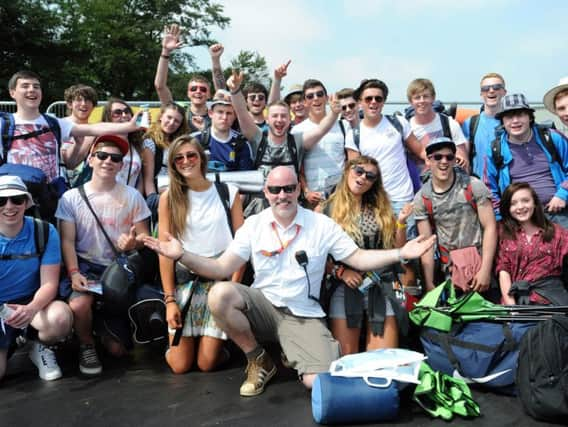T in the Park chief: music festivals have changed forever


But now the organiser of T in the Park has admitted that the festival landscape has changed forever due to dramatic changes in the habits and demands from music fans.
Geoff Ellis has cited dwindling repeat business, the rise of “boutique” events, a lack of major bands, “experience-chasing” millennials and audience demands for better facilities for dramatic changes in the UK’s festival scene.
Advertisement
Hide AdAdvertisement
Hide AdThe chief executive of promoters DF Concerts said audiences no longer had the “Woodstock mentality” and were not prepared to “rough it” when attending an event.
He said many fans now expected to have the choice of staying in a teepee or a yurt at a major festival and were only attending an event like T in the Park to “tick the box”.
Mr Ellis, who called off this year’s T in the Park for a long-term rethink over the event’s future, said it will have to be completely reinvented before it returns. He was speaking at Wide Days, a major music industry seminar in Edinburgh, during a discussion on the future of festivals.
DF announced in November that the 2017 event had been called off so that the organising team could “take stock”. It is instead staging a non-camping festival in Glasgow in July.
Speaking at Wide Days, Mr Ellis said: “It’s a constantly evolving marketplace, more so in the last couple of years than ever before. We’ve seen the rise of boutique festivals throughout the UK, as well as a Europe. That’s had a big effect.
“People used to go to maybe two or three festivals in the summer. Now they can’t afford to – they can usually only afford one. People have much more choice now.
“We’ve taken a year out of T in the Park. When we come back with a new camping festival it will be different – it will have to be, the market has changed in the last two or three years. It’s not a bad thing. It’s exciting. If everything stayed the same it would be boring.
Advertisement
Hide AdAdvertisement
Hide Ad“The big thing we’ve noticed is the behaviour of millennials now. They maybe want to go to a festival like T in the Park or Creamfields, but once they’ve ticked that box they’re off the next year to Magaluf or a festival in Serbia.
“It’s not that they didn’t have a good time, it’s because they want to keep doing different things, whereas a festival-goer ten years ago would go back every year with their mates. That’s all changed. People are chasing the next experience.
“I wouldn’t say it’s lack of loyalty. It’s just that you have less chance of repeat business from a young audience than you had ten years ago. If your key demographic is 18-25, you now have to accept you’re not going to get the same people coming back every year. You have to keep it fresh."
First staged in 1994, T in the Park was forced to relocate from long-time home Balado, in Kinross-shire, in 2015 due to long-standing concerns from the Health and Safety Executive over an oil pipeline running underneath the site.
However, the event was dogged by problems at its new home in the grounds of Strathallan Castle, in Perthshire, including traffic chaos, crowd congestion, antisocial behaviour and the cost of protecting wildlife, including nesting ospreys.
Mr Ellis added: “There’s never going to be one size that’s fits all. You’ve always go to look at what your audience wants and bring things forward.
“Putting decent toilets in 20 years ago was seen as innovative. Now everybody expects to be able to get a tee-pee or a yurt when they go to a festival. Audience demands have changed and people don’t want to rough it like they perhaps used to 20 years ago.
“The old Woodstock mentality of standing there in a field and having a warm pint of lager are long gone.”